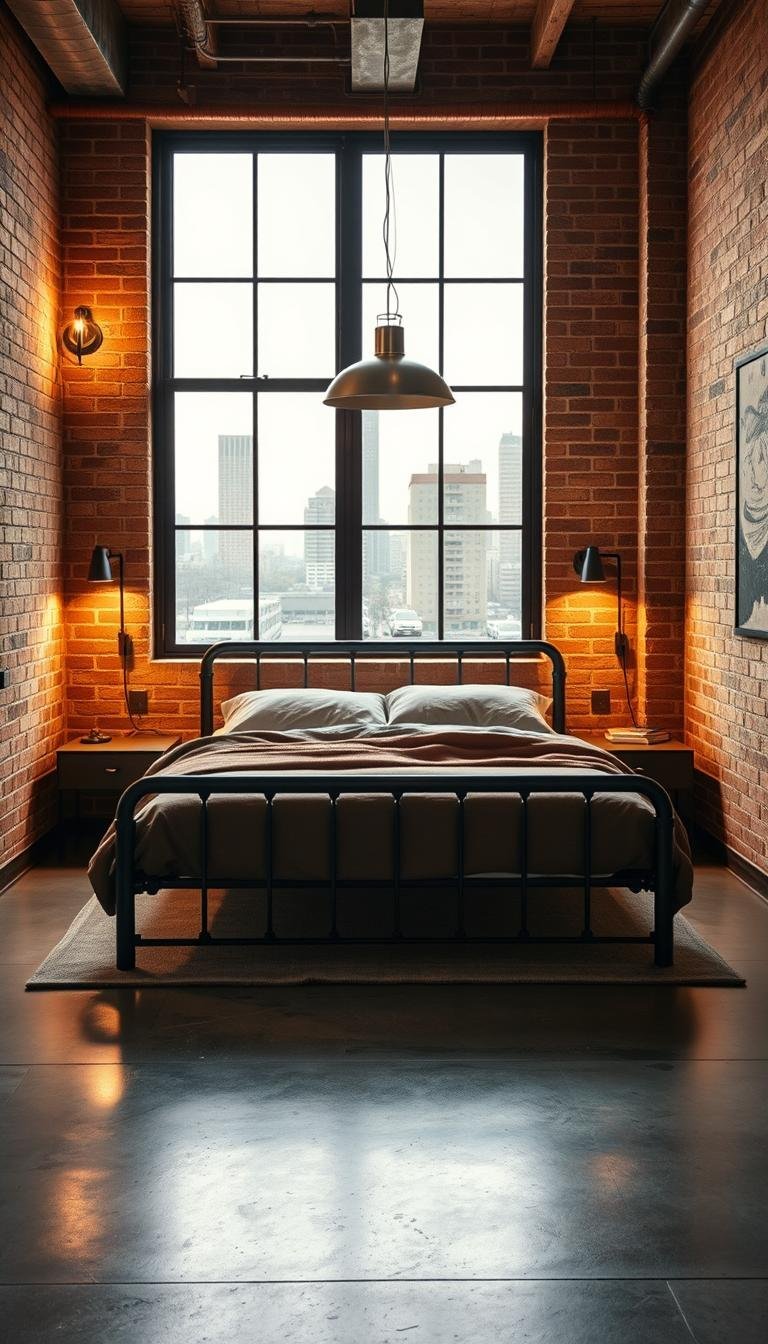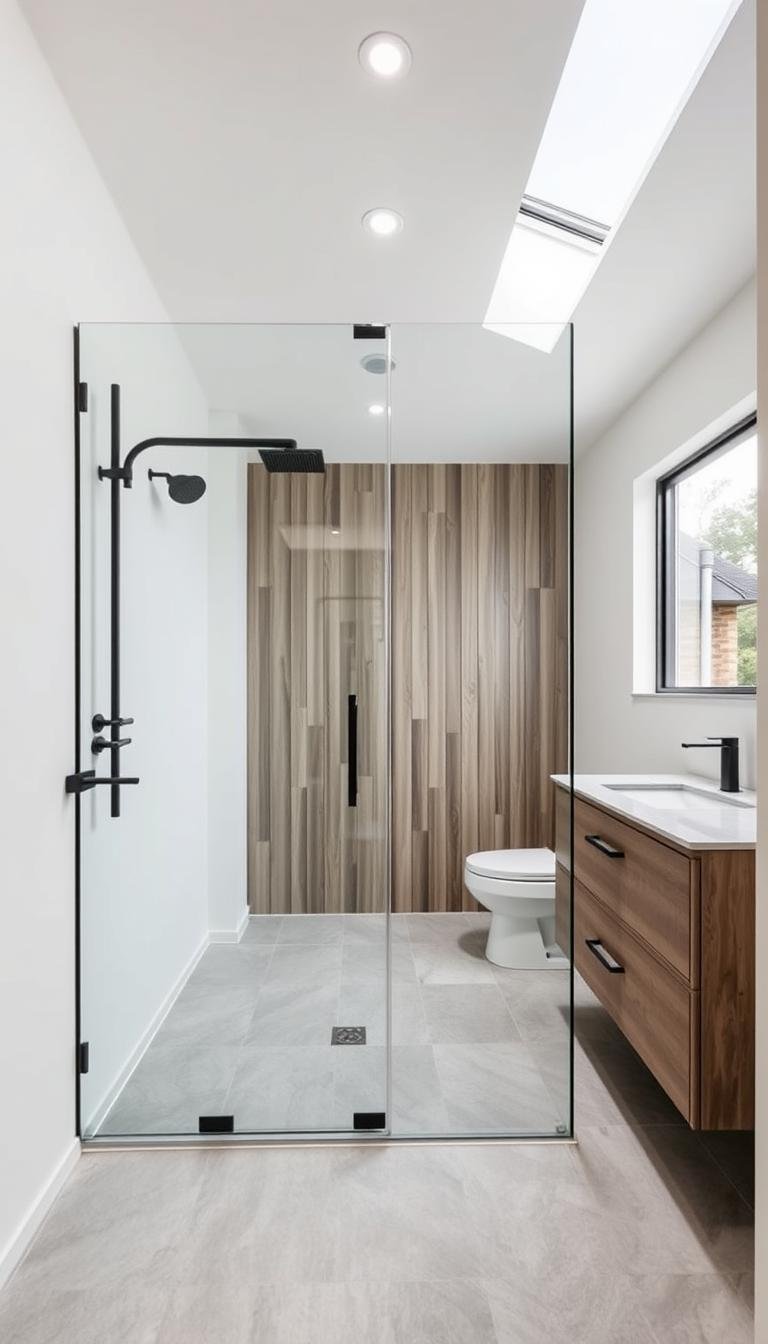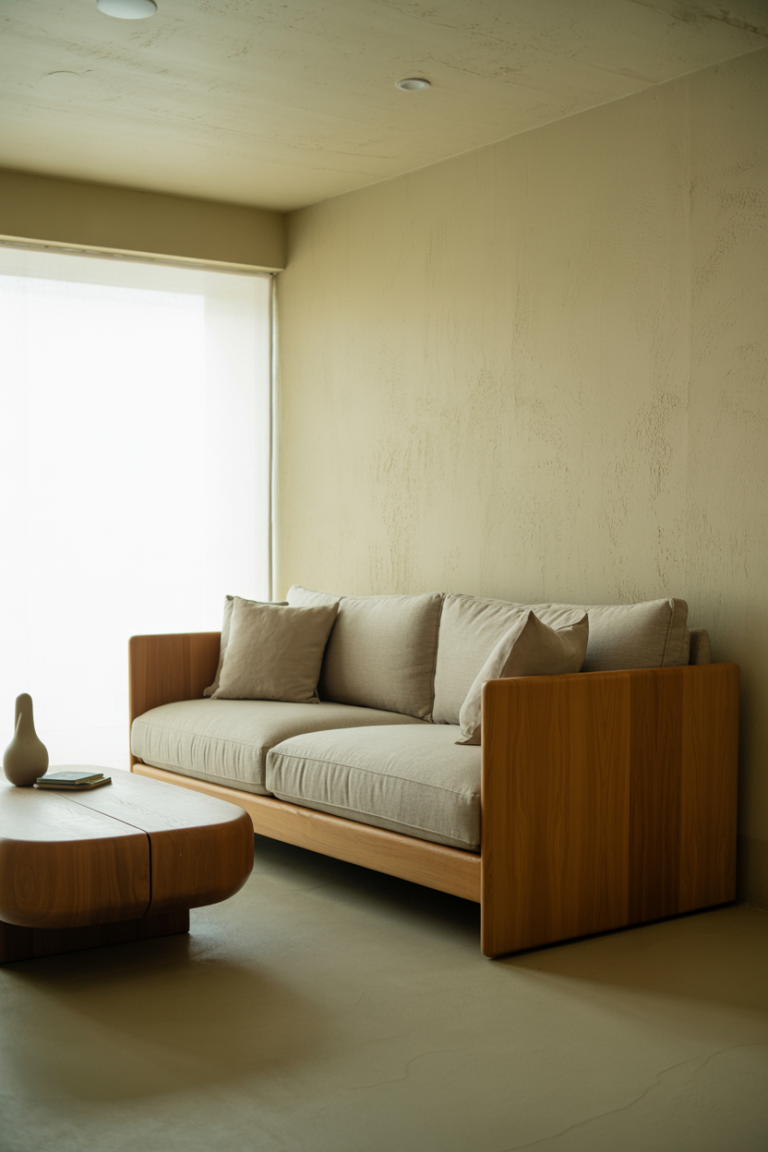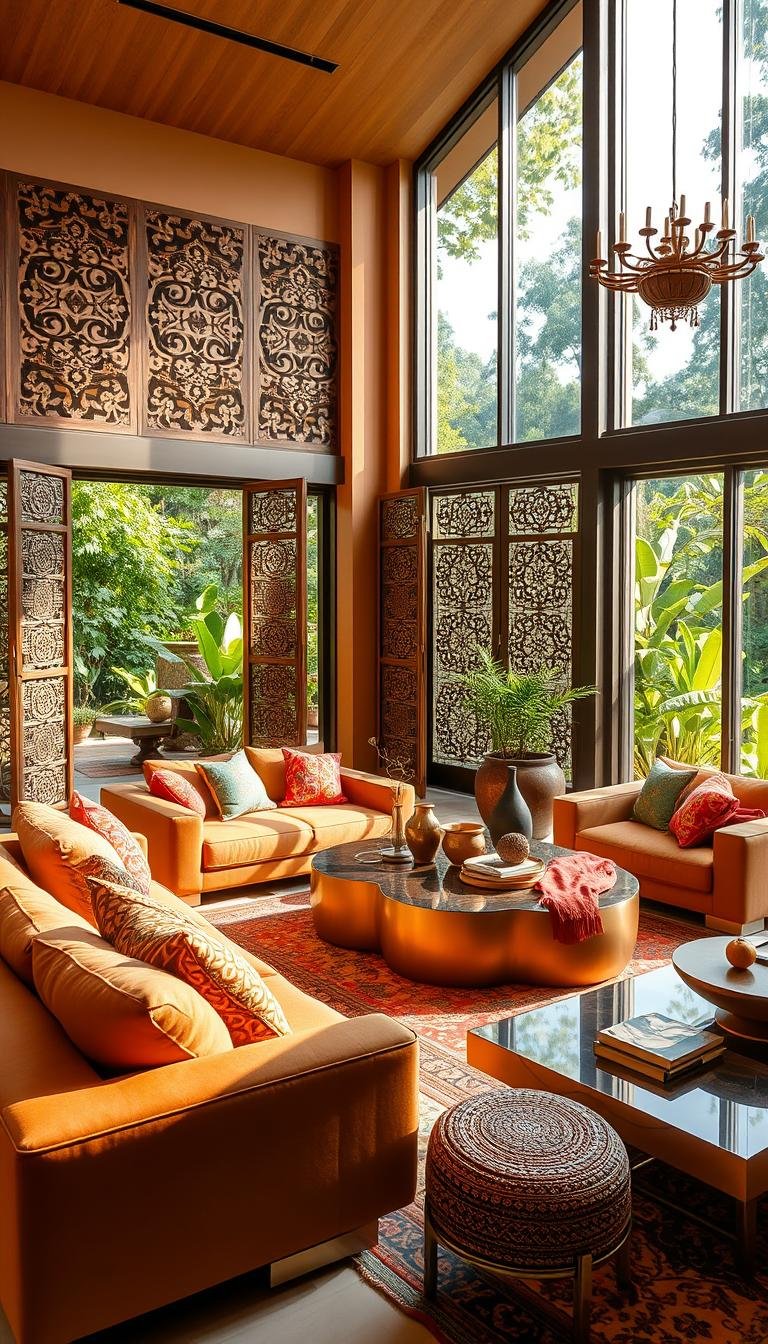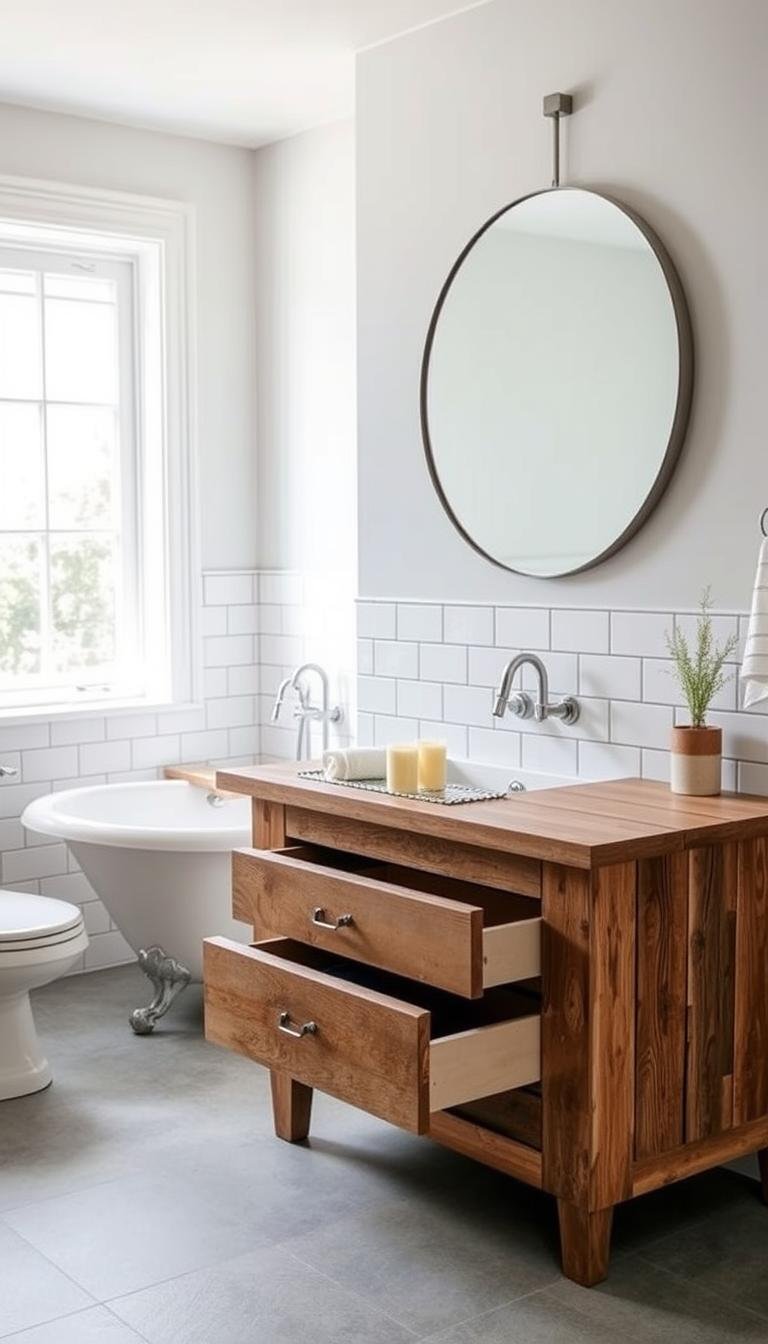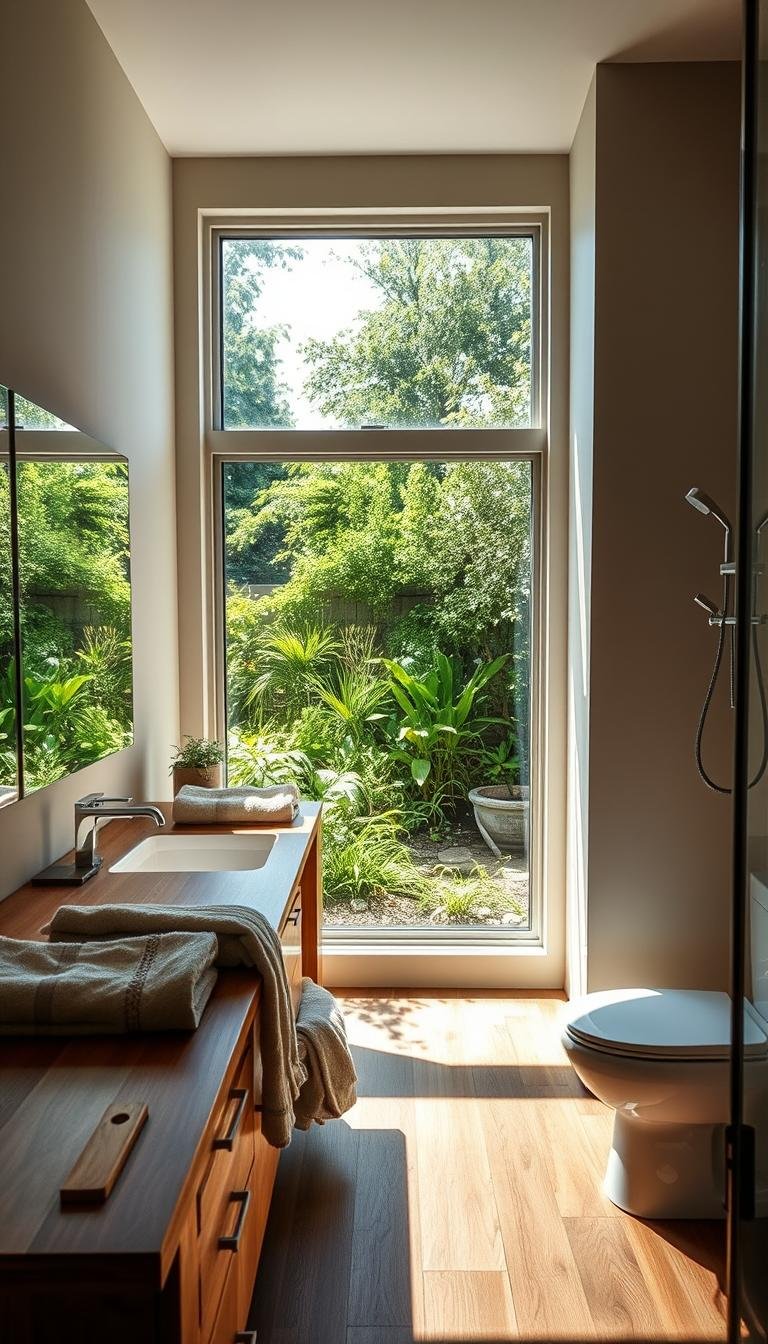This post may contain affiliate links. If you click and buy, we may earn a small commission at no extra cost to you. Learn more.
Industrial bedroom design brings the bold energy of urban spaces into cozy retreats. This style, rooted in converted factories and warehouses, mixes raw elements like concrete and metal with warm touches for modern homes.
Want to transform your bedroom with industrial bedroom ideas? This guide covers materials, colors, and furniture to create a space that’s both stylish and functional. Ready to blend rugged charm with comfort? Let’s explore practical steps to redesign your room today.
Contents
- 1 Understanding the Industrial Bedroom Aesthetic
- 2 Choosing the Right Furniture for an Industrial Bedroom
- 3 Color Schemes That Work in Industrial Bedrooms
- 4 Lighting Solutions for an Industrial Look
- 5 Flooring Options for an Industrial Vibe
- 6 Accessorizing with Industrial Decor
- 7 Creating a Cozy Atmosphere in an Industrial Bedroom
- 8 Storage Solutions That Fit an Industrial Theme
- 9 Transforming Existing Spaces into Industrial Bedrooms
- 10 Real-Life Inspiring Industrial Bedroom Examples
Understanding the Industrial Bedroom Aesthetic
Industrial style bedrooms are bold and urban. They use materials like metal, concrete, and reclaimed wood. They also keep things simple and clutter-free. Whether you’re starting fresh or updating, these designs focus on being real and useful.
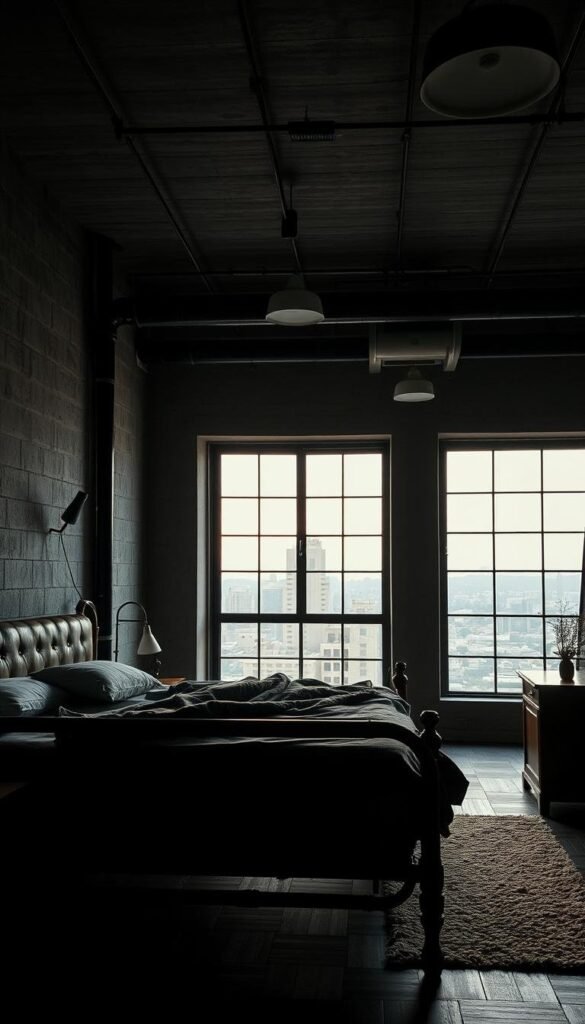
Key Characteristics of Industrial Design
Industrial style is all about being real. Look for:
- Exposed elements like brick walls, ductwork, or concrete floors
- Functional furniture with clean lines and minimal ornamentation
- Open layouts that emphasize space and vertical height
The Role of Textures and Materials
Contrasting textures add interest. Pair:
- Rough surfaces like unfinished brick with smooth polished concrete
- Metal accents (exposed pipes, steel beds) against soft textiles (plush rugs, linen bedding)
- Reclaimed wood headboards paired with sleek glass tabletops
Color Palettes for Industrial Spaces
Neutral tones are key for industrial bedrooms. Try:
- Charcoal grays, weathered whites, and earthy browns as base colors
- Accents in rust orange, burnt sienna, or deep blues for warmth
- Black metal finishes as grounding elements
Mixing these elements thoughtfully makes the space feel lived-in yet purposeful. It’s design with attitude—where every choice tells a story of functionality and history.
Choosing the Right Furniture for an Industrial Bedroom
Industrial bedroom furniture brings a bold look and practical design. Choose pieces that mix toughness with comfort. A metal bed or a wood nightstand adds style without taking over the room.
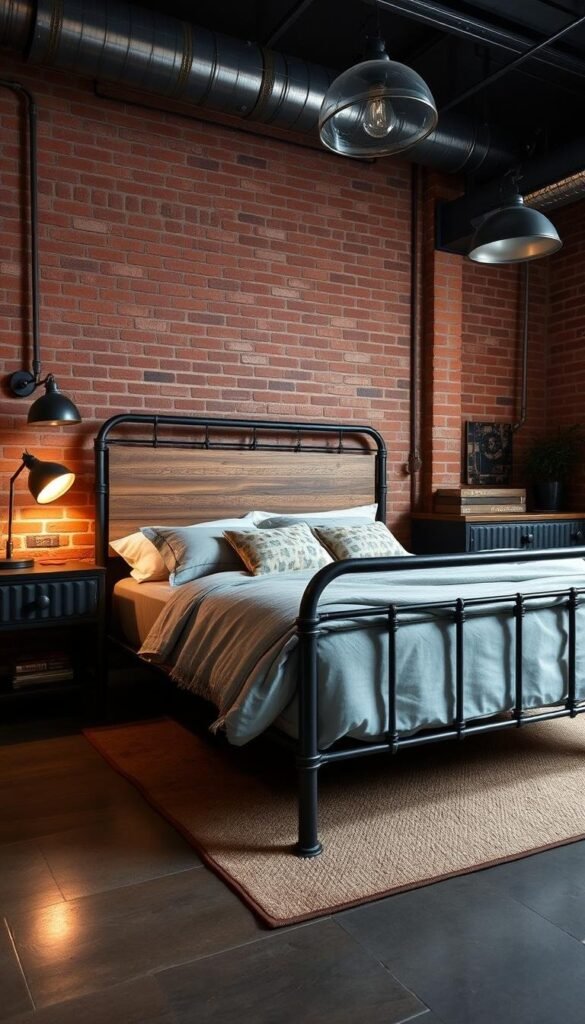
Essential Furniture Pieces
A good industrial bedroom set has these must-haves:
- Metal bed frames with exposed screws or pipe details
- Exposed-wood nightstands with raw, unfinished edges
- Open-shelf units for visible storage that also decorates
- Leather or canvas chairs for cozy seating
Look for brands like West Elm or CB2 for modern industrial looks. Mix new items with vintage ones to keep the space lively.
Tips for Sourcing Vintage or Reclaimed Items
“The best industrial rooms tell a story—each piece should feel like it has a history,” says interior designer Mara Torres.
- Visit flea markets weekly to find unique items
- Check salvage yards for weathered wood planks to make shelves
- Search Etsy for handmade industrial-style lighting or hardware
- Pair reclaimed wood items with sleek metal pieces for contrast
Invest in a mix of factory-made and handmade items. A steel bed paired with a salvaged-wood bench adds depth without breaking the bank. Focus on durability—industrial style shines when furniture looks both useful and well-used.
Color Schemes That Work in Industrial Bedrooms
In an industrial bedroom, the right colors mix raw materials with warmth. Modern designs use colors that remind us of factories but also add a personal touch. Let’s look at how to pick and layer colors that make this style shine without losing its essence.
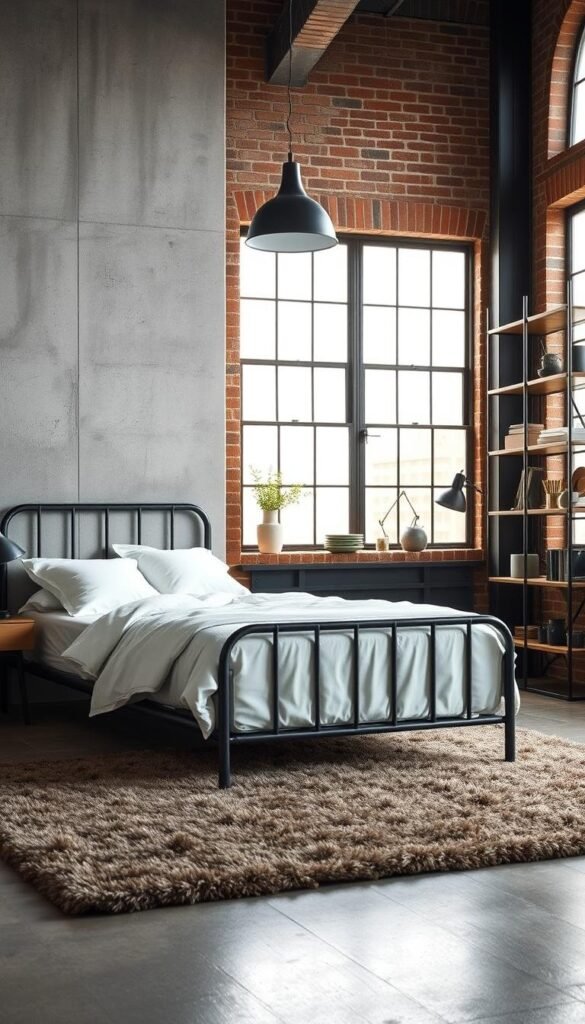
Popular Color Choices
Begin with colors that show industrial roots. Charcoal gray is a great base, matching well with metal. Rust tones, like PPG Paints’ “Rustic Harvest,” bring a natural feel. Navy blue, such as Sherwin-Williams’ “Dark Navy,” adds depth. And matte black accents, like on furniture legs, make striking points.
Combining Neutrals with Bold Accents
A neutral base keeps the room feeling open. Use whites (Benjamin Moore’s “Simply White”) or light grays as the main colors. Add bold touches: a burnt orange throw on a bed, or a red gallery wall. Use bedding or rugs to tie colors together.
For example, a navy headboard against a light wall creates a nice contrast without being too much. Tip: Wall art in metallic or monochromatic prints can enhance the industrial look. Try out accent colors on small items first, like cushions or lamps, to see if they work without overwhelming the room.
Lighting Solutions for an Industrial Look
Lighting is key in industrial bedroom design. The right lights can soften the raw textures and open spaces. They turn harsh edges into a cozy retreat. Here’s how to choose the best lighting.
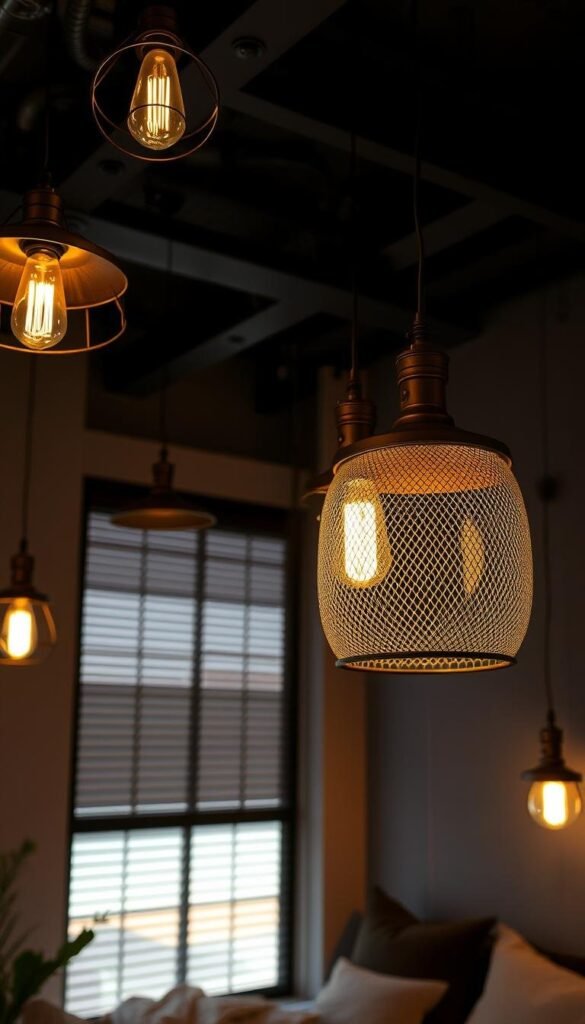
Types of Lighting Fixtures
Industrial spaces need lights that show off materials and function. Mix these for a unified look:
- Metal pendant lights with exposed bulbs, like Schoolhouse Electric’s industrial pendants, add bold focal points.
- Adjustable wall sconces from Tech Lighting provide task lighting without sacrificing style.
- Floor lamps with articulating arms, such as Hudson Valley’s industrial designs, offer adjustable brightness and direction.
Layer these fixtures with track lighting or under-cabinet strips for warm, functional zones. Exposed wiring and metallic finishes boost the industrial feel.
Maximizing Natural Light in Your Bedroom
Natural light makes industrial designs shine. Use these tips to maximize daylight:
- Pair raw linen curtains from West Elm with sheer roller shades from IKEA for soft diffusion.
- Paint walls in neutral tones like cream or gray to reflect natural light and maintain an open feel.
- Avoid heavy drapes; instead, opt for minimalist blinds that let sunlight flow freely.
Combining artificial and natural light makes spaces feel both energizing and cozy. This balance is essential for a timeless industrial chic bedroom.
Flooring Options for an Industrial Vibe
Flooring is key for any industrial style bedroom. Pick materials that show the raw, unpolished look of this style. Hard surfaces like concrete or wood are great. They add realness without making small spaces feel cramped.
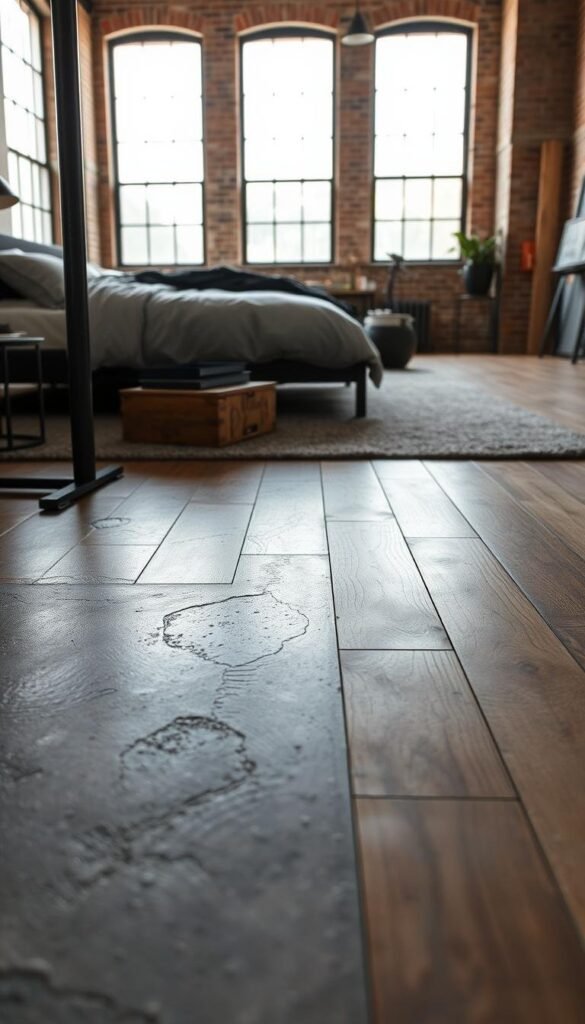
Best Flooring Styles
- Polished concrete: It has a sleek, modern look. Sealed finishes keep it easy to clean.
- Reclaimed wood planks: Distressed oak or pine brings warmth. Dark stains contrast well with metal.
- Large-format tiles: Gray or black grout lines give a concrete feel. Ceramic or porcelain tiles are affordable.
- Luxury vinyl: It looks like concrete or weathered wood. It’s durable and good for wet areas.
Incorporating Area Rugs
Balance hard floors with rugs that enhance industrial bedroom decor. Use natural fibers like jute or sisal for texture. Patterns like geometric or muted industrial motifs add interest without clashing.
“A well-placed rug can transform a cold floor into a cozy anchor for the room,” says interior designer Clara Bennett.
Place rugs under platforms beds or seating areas to define zones. Choose neutral bases with subtle patterns. Wool blends are soft and durable, great for long-term use.
When picking, think about your budget and lifestyle. Flooring choices should show both function and the boldness of industrial design.
Accessorizing with Industrial Decor
Creating an industrial bedroom needs careful thought in accessories. Industrial bedroom decor is all about details that tell a story. Look for repurposed items that have been given a new life.
Key Accessories to Consider
- Vintage metal signs or tool racks add instant industrial flair.
- Industrial clocks with exposed gears become focal points on shelves.
- Rustic baskets or leather straps add texture without breaking clean lines.
- Repurposed machinery parts (think pulleys or valves) work as sculptural pieces.
Art That Fits the Industrial Vibe
Wall decor should balance function and art. Use technical prints like architectural blueprints or factory photography. Metal sculptures or welded wire art look great with raw materials like concrete or brick. A gallery wall of black-and-white factory photos ties everything together.
“Mix 70% neutral items with 30% bold accents for balanced industrial bedroom ideas,” advises interior designer Clara Monroe. “Let one standout piece anchor the space.”
Choose a few key pieces instead of too many. Place objects at different heights on shelves, but don’t stack more than three together. The aim is to enhance the room’s industrial feel without distractions.
Creating a Cozy Atmosphere in an Industrial Bedroom
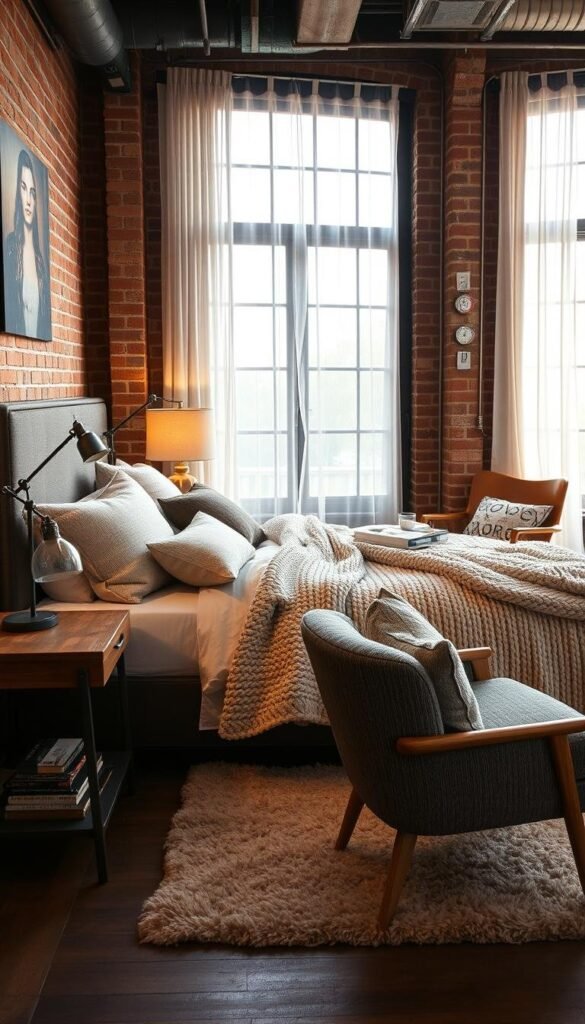
Industrial bedrooms often have hard surfaces like concrete or metal. But, adding soft textures can make these spaces cozy. Start with bedding: choose chunky-knit throws, linen duvet covers, and wool blankets. These fabrics add warmth without losing the industrial chic bedroom look.
Incorporating Soft Textiles
- Heavyweight cotton sheets for a crisp yet cozy feel
- Velvet cushions or faux fur accents for bold contrast
- Layered rugs in jute or sheepskin to soften floors
Layering Techniques for Comfort
Build warmth by layering fabrics. Start with a neutral-toned duvet, then add textured throws and folded pillows. Hang woven tapestries on brick walls to muffle noise and add depth. Even a few well-placed blankets can turn an industrial bedroom into a cozy sanctuary.
Mixing materials like leather and linen adds tactile contrast. Pair a metal bedframe with a down comforter, or drape a woolen shaggy rug under a concrete bench. This mix of textures balances rugged and restful, proving industrial style can be cozy.
Storage Solutions That Fit an Industrial Theme
Maximizing storage without losing style is essential in an industrial bedroom. Metal-framed dressers and open shelving units are both functional and stylish. These pieces turn practical needs into design statements.
Whether you’re creating a custom industrial bedroom set or using vintage pieces, these tips help. They keep clutter hidden while boosting the room’s vibe.
Creative Storage Ideas
Think beyond traditional closets. Repurposed factory carts can be under-bed storage. Metal lockers stacked vertically add character.
West Elm offers storage benches made from reclaimed wood and steel. They serve as both storage and seating. Old ladder racks can be turned into wall-mounted organizers for belts or scarves.
- Use industrial-style trunk chests for seasonal items
- Hang tool belts on exposed wall hooks for jewelry storage
- Opt for clear acrylic bins under platform beds
Using Shelving Effectively
Steel beam shelving units from CB2 provide vertical storage without taking up space. Pair them with raw steel shelves, concrete planters, and minimalist baskets. For small rooms, floating shelves anchored to exposed brick walls are a good choice.
Mix open and closed storage. A metal armoire can hide clothes, while open cubbies display books or art.
“Industrial design isn’t just about looks—it’s about making every piece earn its place,” says interior designer Clara Morgan. “A well-placed steel console table can hold keys, mail, and even serve as a nightstand.”
Metal ladders leaning against walls add rustic charm. They can hold baskets or framed photos. Stackable storage cubes in matte black finish are great for linen closets. Every piece should feel intentional, whether it’s a repurposed tool cabinet or a sleek industrial bedroom set.
Transforming Existing Spaces into Industrial Bedrooms
Updating your bedroom doesn’t mean you have to start from scratch. Even small changes can make a big difference. Look for elements that fit the raw, functional vibe of industrial style. Focus on practical steps that add character without spending a lot.
Reimagining Your Current Decor
- Swap hardware: Replace cabinet knobs with sleek metal pulls.
- Show material texture: Expose brick walls or leave wooden beams unpainted.
- Add metallic accents: Hang pendant lights or place iron sculptures.
DIY Ideas for a Quick Update
Try these projects to boost your space’s industrial appeal:
- Pipe Shelving – Use galvanized pipes and brackets to build floating shelves. Cost: $30–$50. Time: 2 hours.
- Weathered Furniture – Sand painted furniture to reveal wood grain. Apply dark wax for an aged look. Time: 3–4 hours.
- Faux Brick Panels – Adhere lightweight panels to walls. Ideal for a bold accent. Cost: $10–$20 per sq ft.
“Even small details, like swapping lampshades for metal options, can make a big difference.”
Start with one or two changes and build from there. A modern industrial bedroom is all about mixing textures and embracing imperfections. Every update brings you closer to the style you love.
Real-Life Inspiring Industrial Bedroom Examples
Seeing industrial style bedrooms in action makes ideas come to life. Real examples show how to mix raw textures with comfort. This proves industrial bedrooms can fit any space. Let’s look at some standout designs and what makes them special.
Case Studies of Successful Designs
A Brooklyn loft turned its bedroom into a masterpiece. It paired a steel bed frame from CB2 with raw concrete tables. Exposed brick walls and a leather bench added depth without clutter.
In a suburban home, a reclaimed wood headboard stood out against sleek acrylic nightstands. This mix of rustic and modern elements worked beautifully. Each space used industrial elements like metal and unfinished wood, but also showed off personal style.
Lessons Learned from Each Example
These designs teach us important lessons. Open shelving from West Elm keeps spaces feeling open, perfect for small bedrooms. Mixing metals like brass and iron adds warmth without losing the look.
Layering lighting with pendant lights and floor lamps makes spaces both functional and stylish. Most importantly, balancing hard surfaces with soft fabrics keeps comfort in mind. Think chunky knit throws.
To bring you cozy inspiration more efficiently, we sometimes use AI to assist in content creation — but every word and idea is carefully shaped by our team. See our AI Disclosure for more info.

